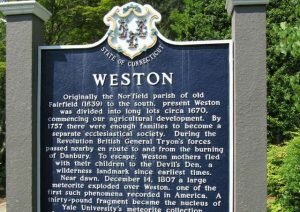 Weston First Selectman Chris Spaulding hosted a Freedom of Information Act (FOIA) training program on Thursday, Feb. 8.
Weston First Selectman Chris Spaulding hosted a Freedom of Information Act (FOIA) training program on Thursday, Feb. 8.
The program was for elected and appointed town officials and employees who were interested in learning more about FOIA. While the meeting wasn’t mandatory, Spaulding strongly encouraged town officials to attend.
“We filled the Town Hall Conference Room and it was a pretty packed house,” said Spaulding. “We had people from almost every board and we sent a copy of the video to everyone who missed the meeting.”
Spaulding said total transparency is one of his primary goals for the town. “Ensuring that everyone understands FOIA is very important to me,” said Spaulding. “Everything that the government does should be open to the media and to the public.”
Spaulding said there have been “slip-ups” in the past where town officials weren’t “up to speed” on the “expectations of FOIA,” but he wants to change that permanently.
The program was hosted by Tom Hennick, a public education officer on Connecticut’s Freedom of Information Committee.
Hennick said it’s “encouraging” when a municipality reaches out to the committee to learn more about FOIA.
“We love doing these sessions,” Hennick said. “It means the town is interested in learning FOIA correctly, and that is very important.”
Hennick called the program FOIA 101, or an overview of the process.
According to Hennick, the law is often misinterpreted. He said that freedom of information doesn’t necessarily mean “free information.”
“It’s not a license to walk into a town hall or a board meeting and start asking questions,” said Hennick. “The law is about two basic things — it’s about access to public meetings and access to public records.”
Hennick told the officials that the more they know about the law the better equipped they will be to handle it. He added that it can be “hard” to interpret what can or cannot be released to the public.
“It’s up to those of you on the front lines to interpret these things on the fly,” he said. “Parts of this can be complicated and difficult, but we want to give you the tools to make the right interpretation.”
Meetings
Hennick said a meeting is defined as any hearing or proceeding of a public agency.
Additionally, any convening or assembly of a quorum of a multi-member public agency or any communication by or to a quorum in person or by means of electronic equipment to discuss or act upon a matter in which the public agency has supervision, control, jurisdiction, or advisory power is a meeting.
“When you gather to do your work in any way, shape or form, it is a meeting,” said Hennick. “Make sure it is properly noticed, make sure it’s open to the public, make sure there are minutes when the meeting is done.”
Hennick said semantics don’t matter. If people are gathered to a task they are assigned to do, then it is a meeting.
There are three types of meetings, according to Hennick: regular meetings, special meetings and emergency meetings.
Regular meetings are scheduled by the town by the end of January every year and usually occur on the same day or days each month. After this is done the meeting enters its “regular meeting slot.”
Special meetings are meetings held when the board isn’t scheduled to meet. “The only thing special about it is that it isn’t in your regular slot,” said Hennick.
Agendas for regular and special meetings must be prepared at least 24 hours in advance.
Hennick discouraged town officials from hosting emergency meetings, which aren’t posted 24 hours in advance.
“If you have an emergency meeting you have to stick to your topic,” he said. “Within 72 hours, you create minutes that reflect what the emergency was, who was there and what you did about it.”
Spaulding asked Hennick if sharing articles online and commenting on Facebook posts can count as meetings.
“I’d be very careful about that,” Hennick said. “It could trigger the type of conversation you are supposed to be having at a table.”
Hennick said violating FOIA rules about meetings can result in nullification of the actions taken at the meeting or, in rare cases, can result in people involved in the meeting being fined.
“We had one first selectman in another town try and stop someone from videotaping a meeting, and we slapped him with a $500 fine,” said Hennick.
